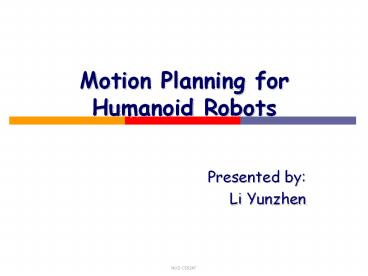Motion Planning for Humanoid Robots - PowerPoint PPT Presentation
Title:
Motion Planning for Humanoid Robots
Description:
Thus, problem is reduced to how to find feet placements (collision-free) ... Assign higher relative weights to links with greater mass and proximity to trunk. ... – PowerPoint PPT presentation
Number of Views:310
Avg rating:3.0/5.0
Title: Motion Planning for Humanoid Robots
1
Motion Planning for Humanoid Robots
- Presented by
- Li Yunzhen
2
What is Humanoid Robots its balance constraints?
Human-like Robots
A configuration q is statically-stable if the
projection of mass center along the gravity
vector lies within the area of support.
3
Survey Papers Goal
- Overview on
- 1.Footstep placement
- J. Kuffner, K. Nishiwaki, S. Kagami, M. Inaba,
and H. Inoue. Footstep Planning Among
Obstacles for Biped Robots. Proc. IEEE/RSJ Int.
Conf. on Intelligent Robots and Systems (IROS),
2001. - 2.Object manipulation
- 3.Full-body motion
- J. Kuffner, S. Kagami, M. Inaba, and H. Inoue.
Dynamically-Stable Motion Planning for Humanoid
Robots. Proc. Humanoids, 2000 - 4. Summary
4
1. Footstep Placement
Goal In an obstacle-cluttered environment,
compute a path from start position to goal region
5
1.Footstep PlacementSimplifying Assumption
- Flat environment floor
- Stationary obstacles of known position and height
- Foot placement only on floor surface (not on
obstacles) - Pre-computed set of footstep placement positions
6
1.Footstep PlacementSimplifying Assumption
Path A sequence of feet placements
trajectories for transition between footstep.
5. Pre-calculate statically stable motion
trajectories for transition between footstep and
use intermediate postures to reduce the number of
transition trajectories. Thus, problem is
reduced to how to find feet placements
(collision-free)
7
1.Footstep PlacementOverall algorithm
8
1.Footstep PlacementBest First Search
- Generate successor nodes from lowest cost node
- Prune nodes that result in collisions
- Continue until a generated successor node falls
in goal region
Red Leaf nodes are pruned from the search
9
1.Footstep PlacementCost Heuristic
- Cost of path to current configuration
- Depth of node in the tree
- Penalties for orientation changes and backward
steps - Cost estimate to reach goal
- Straight-line steps from current to goal
- weighting factors are empirically-determined
10
1.Footstep PlacementCollision Checking
Two-level 2D polygon-polygon intersection test
foot VS attempted position 3D polyhedral
minimum-distance determination Robot VS Obstacle
11
2.Object Manipulation
- Task move a target object its new location.
- Normally 3 steps
- Reach
- Transfer
- Release
12
3.Full Body Motion
- Challenge dues to
- The high number of degrees of freedom
- Complex kinematic and dynamic models
- Balance constraints that must be carefully
maintained in order to prevent the robot from
falling down
13
Full Body Motion
- Given two statically-stable configurations,
generate a statically stable, collision-free
trajectory between them - --Kuffner, et. al, Dynamically-stable Motion
Planning for Humanoid Robots, 2000.
14
Rapidly-exploring Random Tree (LaValle 98)
- Efficient randomized planner for high-dim. spaces
with - Algebraic constraints (obstacles) and
- Differential constraints (due to nonholonomy
dynamics) - Biases exploration towards unexplored portions of
the space
15
Full Body MotionModified RRT
q
qinit
qgoal
- Randomly select a collision-free, statically
stable configuration q.
16
Full Body MotionModified RRT
q
qinit
qnear
qgoal
- Select nearest vertex to q already in RRT
(qnear).
17
Full Body MotionModified RRT
q
qtarget
qinit
qnear
qgoal
- Make a fixed-distance motion towards q from qnear
(qtarget).
18
Full Body MotionModified RRT
q
qtarget
qinit
qnew
qnear
qgoal
- Generate qnew by filtering path from qnear to
qtarget through dynamic balance compensator and
add it to the tree.
19
Extend(T,q)
- qnear ? NEAREST_NEIGHBOR(q,T)
- If NEW_CONFIG(q,qnear,qnew) then
- T. add_vertex(qnew)
- T. add_edge(qnear,qnew)
- if qnew q then return Reached
- else return Advanced
- return Trapped )
20
RRT_CONNECT_STABLE( qinit, qgoal)
- 1. Ta.init( qinit ) Tb.init( qgoal)
- 2. For k 1 to K do
- 3. qrand? RANDOM_STABLE_CONFIG()
- 4. if not( EXTEND(Ta, qrand Trapped )
- 5. if( EXTEND(Tb, qnew) Reached )
- 6. return PATH(Ta, Tb)
- 7. SWAP(Ta, Tb)
- 8. return Failure
21
RRT VS Expansive Sampling
Expansive Space Tree Merit Widening Narrow
passage
RRT Merit Random Sampling, can find a solution
very fast if no narrow pasage.
22
Full Body MotionDistance Metric
- Dont want erratic movements from one step to the
next. - Encode in the distance metric
- Assign higher relative weights to links with
greater mass and proximity to trunk. - A general relative measure of how much the
variation of an individual joint parameter
affects the overall body posture.
23
Full Body MotionRandom Statically stable postures
- It is unlikely that a configuration picked at
random will be collision-free and
statically-stable.
- Solution Generate a set of stable
configurations, and randomly choose one from this
set then do collision checking.
24
Full Body MotionRandom stable postures
25
Full Body MotionExperiment
Dynamically-stable planned trajectory for a
crouching motion
Performance statistics (N 100 trials)
26
Full Body MotionSummary
This paper presents an algorithm for computing
dynamically- Stable collision-free trajectories
given full-body posture goals. Limitation The
current implementation of planner can only handle
a fixed position for either one or both feet.
27
Summary
- Footstep placement
- Object manipulation
- Full-body motion
- Combining above 3 task level concepts,
- it is feasible to order a humanoid robot to go to
a place under certain stable posture with some
tools to do sth?































